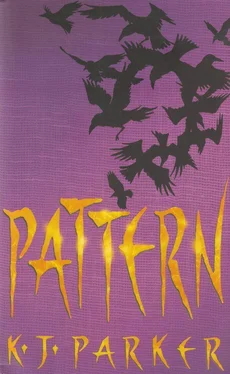K Parker - Pattern
Здесь есть возможность читать онлайн «K Parker - Pattern» весь текст электронной книги совершенно бесплатно (целиком полную версию без сокращений). В некоторых случаях можно слушать аудио, скачать через торрент в формате fb2 и присутствует краткое содержание. Жанр: Фэнтези, на английском языке. Описание произведения, (предисловие) а так же отзывы посетителей доступны на портале библиотеки ЛибКат.
- Название:Pattern
- Автор:
- Жанр:
- Год:неизвестен
- ISBN:нет данных
- Рейтинг книги:3 / 5. Голосов: 1
-
Избранное:Добавить в избранное
- Отзывы:
-
Ваша оценка:
- 60
- 1
- 2
- 3
- 4
- 5
Pattern: краткое содержание, описание и аннотация
Предлагаем к чтению аннотацию, описание, краткое содержание или предисловие (зависит от того, что написал сам автор книги «Pattern»). Если вы не нашли необходимую информацию о книге — напишите в комментариях, мы постараемся отыскать её.
Pattern — читать онлайн бесплатно полную книгу (весь текст) целиком
Ниже представлен текст книги, разбитый по страницам. Система сохранения места последней прочитанной страницы, позволяет с удобством читать онлайн бесплатно книгу «Pattern», без необходимости каждый раз заново искать на чём Вы остановились. Поставьте закладку, и сможете в любой момент перейти на страницу, на которой закончили чтение.
Интервал:
Закладка:
Chapter Five
The vestry roof was burning.
When they told him, he was extremely annoyed. Damn it, he thought, as he yawned awake out of a delightfully pastoral dream (something about being a blacksmith on a farm, making pot-hooks), this is ridiculous. I'm a soldier, I'm supposed to be conducting an orderly defence of a fortified position, not fooling about with buckets of water. If they wanted a fireman, they should've hired a specialist.
But he left his post in the charge of a thoroughly terrified captain of archers, and hurried down the narrow spiral staircase. Twice he nearly lost his footing-the soles of his boots had been worn thin and smooth on the parade ground, and the stairs were polished-but luckily there was a guide-rope at the side he could catch hold of. Just as well; this wouldn't be a good time to fall and break his leg.
(There was a crow in this dream; but it was floating on top of the hot air rising from the fire, a long way out of stone-throwing range. It called to him in crow language, but he couldn't understand what it was saying. Its presence implied that he was still dreaming, though he could distinctly remember having woken up. Were there really such things as crows when he was awake? Or were they some species of fabulous beast, the sort you can only believe in when you're dreaming?)
From the courtyard he had a good view of the problem. At some point during the night, the enemy had got tired of lobbing stones and arrows over the wall into an empty square with nothing left in it to break or hurt and had started sending over firepots instead. Most of them had smashed harmlessly on the flagstones and burnt themselves out-throughout the attack, he'd been convinced that his greatest asset and ally was the enemy's chief engineer, who clearly couldn't read a scale or set an accurate trajectory if his life depended on it-but one or two had overshot the yard completely and pitched on the vestry slates, where their burning oil could drip through the cracks made by their impact into the roof space below. It was a pity, all things considered, that the monks had decided to use the roof space to store a thousand years' worth of archives.
'I say let it burn,' said the ranking engineer, third from the top in the chain of command and clearly not happy at being woken up in the middle of the night. 'After all, it's freestanding-even if the wind changes it's not going to spread to the other buildings. And it's got no strategic importance, it's just a chapel.'
He couldn't agree more; but unfortunately he had his orders. 'Unacceptable,' he said. 'We've got to put it out. What I'm asking you is, how?'
The red and yellow light of the fire made the engineer's face shine grotesquely in the darkness. 'That's a very good question,' he said. 'Once a building like that makes up its mind to burn to the ground, there's not a lot you can do. What with the confined space and the lack of equipment, you're down to a lot of men with buckets. There's the well in the yard, but it's too deep and narrow to give you enough water for this job. You'd be better off with a longer chain, drawing off the carp ponds or the aqueduct. Both would probably be best.'
'Fine,' he replied. 'All right, you round up every bucket and basin you can find.' He turned to face the guard commander. 'You get anybody who can move, I want a chain from the ponds and another from the aqueduct, like he just said. See if you can get up the back stairs as well as the front; if we can tackle the fire from both ends at once, I reckon we'll have a better chance.'
Neither of them looked exactly hopeful as they scurried off on their respective errands, and he couldn't say he blamed them; from where he was standing the fire was already fairly well established, and even a slight breeze would turn the whole building into a furnace. He'd seen enough fires in his time to know that.
(And yet, when you're camping out in the cold rain and what you need most in the whole world is a nice cheerful roaring fire, can you get one to light? Can you hell as like. Just like when you've got a busy day ahead of you in the forge, and the coal's damp and there's no kindling in the bucket. The fire god's sense of humour isn't his most attractive attribute.)
They did the best they could in the circumstances, but that was never going to be enough. A hundred men dragged out of desperately needed sleep and told to put out a well-established fire in an entirely superfluous building with an inadequate supply of buckets and water were always going to be wasting their time. When the rafters and joists were starting to burn through and the situation got too dangerous to justify the risk, he called them off and told them to forget it. By that stage they were too exhausted to get back to sleep, and most of them stood aimlessly in the yard, watching the building gradually subsiding into the flames. They didn't seem to care particularly, one way or the other.
'It was a lost cause,' said a voice beside him. He looked round, and saw the diminutive figure of the vice-chaplain, whose name he couldn't remember offhand.
'Even so, I'm sorry,' he said. 'I know how priceless those papers were. A thousand years of history-'
He stopped; not because the chaplain had interrupted him, but because he could sense that the little man was laughing at him. 'Please,' the chaplain said, 'don't worry about that, it really doesn't matter. True, we've just lost ten centuries of collected theological commentaries, speculation and debate. Good riddance. They were all wrong, you see.'
He frowned. 'Oh,' he said.
The chaplain laughed; not the sort of hysterical cackle you might expect from someone who's watching his entire world slowly drifting down in the form of thin slivers of white ash, but the genuine amusement of someone who's fully recognised his own absurdity. 'Well, of course,' he said. 'For a thousand years, we've been anticipating the return of the divine Poldarn. Every possible interpretation and analysis and hypothesis, every argument and refutation and counter-refutation-I don't know if you're familiar with the Sansory school of intaglio jewellery, but its main feature is that every last pinhead of space is covered with florid, intricate engraving and decoration, unspeakably vulgar and overdone. That's religious scholarship, only we don't just limit ourselves to the superficial level. We've left our tasteless little acanthus-leaf scrolls on everything. And now we have the satisfaction of knowing that everything we ever said and wrote about the subject was completely wrong.'
'You do?'
'Obviously we do,' the chaplain said. 'It's as plain as day. Poldarn has indeed returned, and he's nothing at all like what we'd thought he'd be. All in all, they've done us a favour, setting light to the archive, covering up the monumental waste of time, effort and money. Otherwise, we'd have had to do it ourselves, sooner or later.'
He scowled. 'No,' he said, 'you're wrong. Poldarn hasn't returned, and the man passing himself off as Poldarn is really nothing more than a vicious, unscrupulous two-quarter mercenary soldier. He's no more a god than I am, believe me.'
'Well.' The chaplain shrugged. 'I agree with you about the man's character and antecedents. But he's Poldarn, no doubt about it.'
The roof-tree of the vestry fell in, showering the courtyard with brilliant orange sparks that were burnt out by the time they reached the ground. 'Excuse me,' he said wearily, 'but that doesn't make sense. Either he's a god or a mercenary captain. He can't be both.'
'Why not?'
Dislodged by the fall of the roof-tree, the cross-beams gave way, one by one, pulling the rafters down with them. 'All due respect, Father,' he said, 'but it speaks for itself. Human beings are human beings, gods are gods. If they weren't gods, where's the point in having them?'
Читать дальшеИнтервал:
Закладка:
Похожие книги на «Pattern»
Представляем Вашему вниманию похожие книги на «Pattern» списком для выбора. Мы отобрали схожую по названию и смыслу литературу в надежде предоставить читателям больше вариантов отыскать новые, интересные, ещё непрочитанные произведения.
Обсуждение, отзывы о книге «Pattern» и просто собственные мнения читателей. Оставьте ваши комментарии, напишите, что Вы думаете о произведении, его смысле или главных героях. Укажите что конкретно понравилось, а что нет, и почему Вы так считаете.












